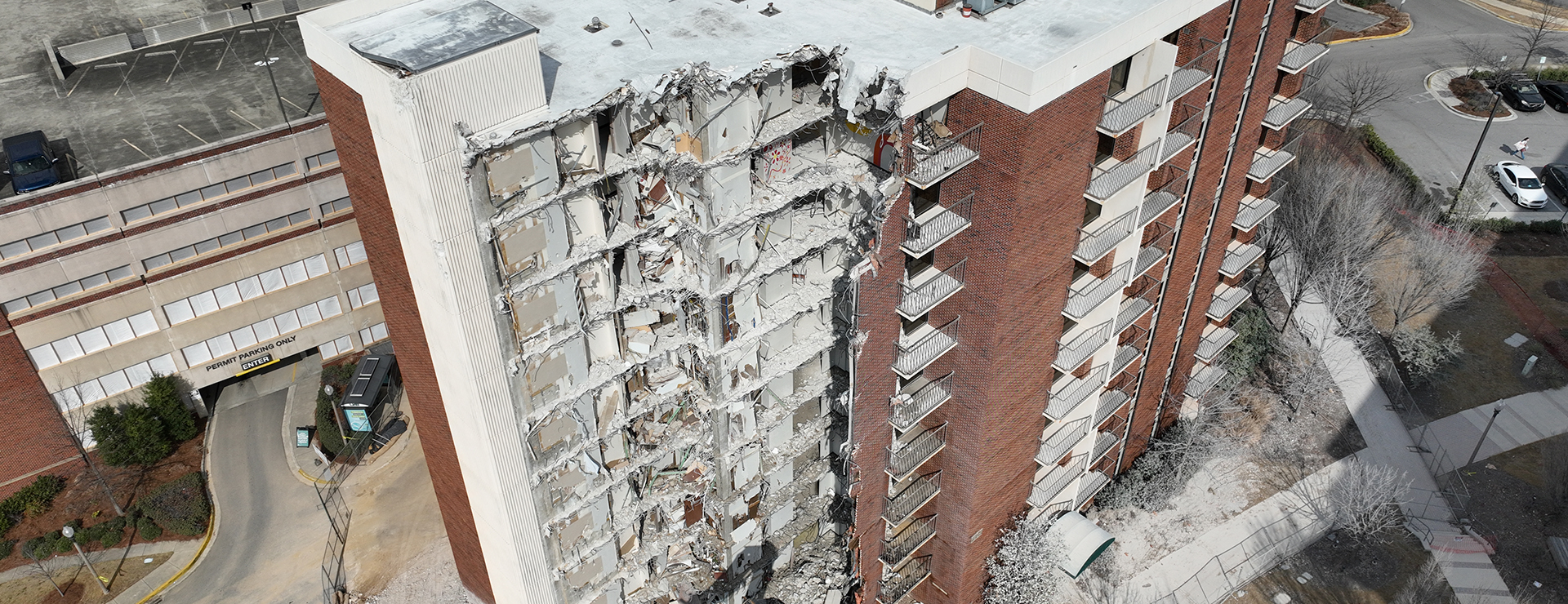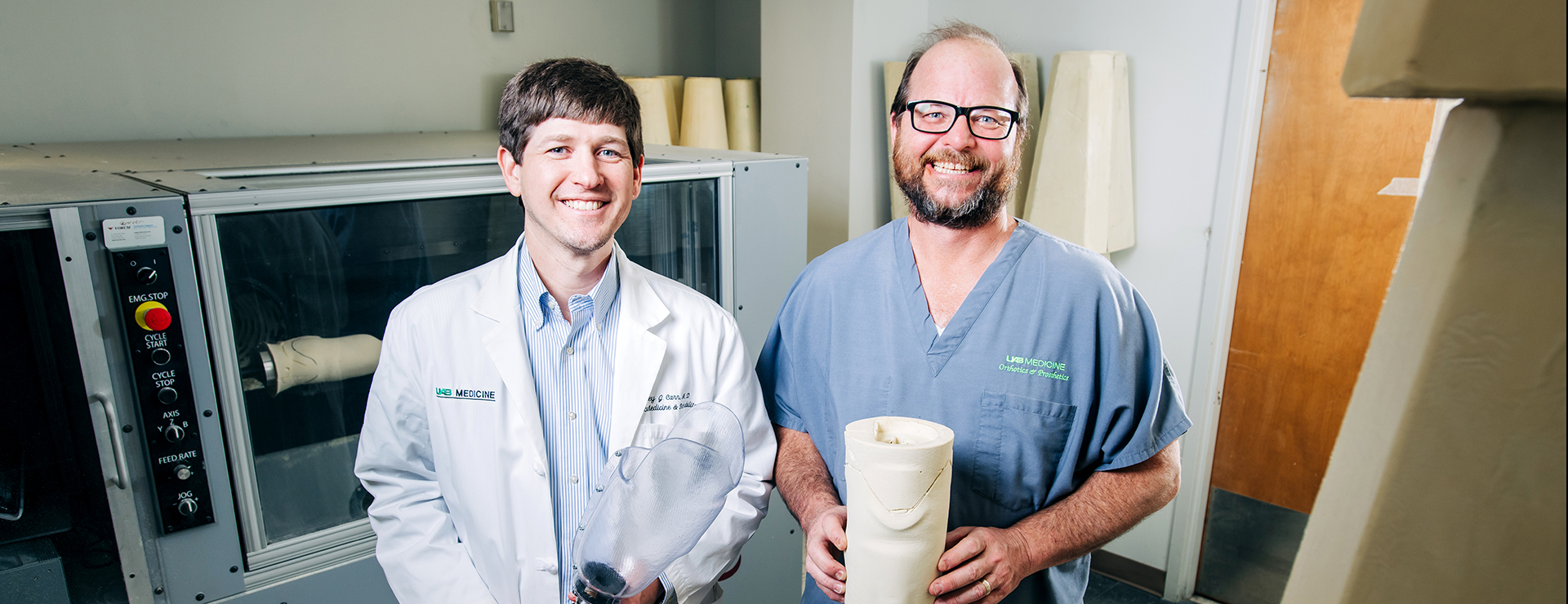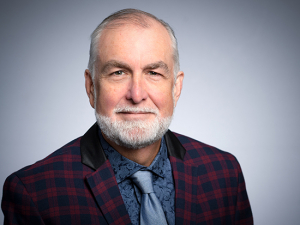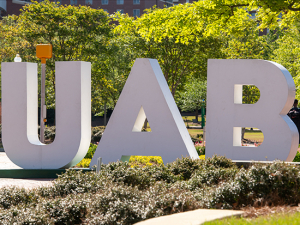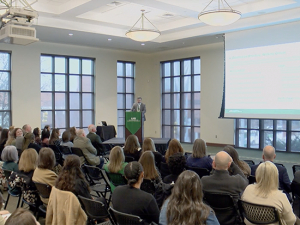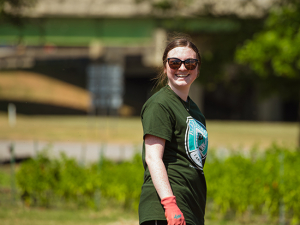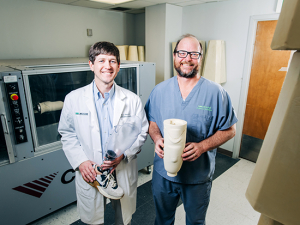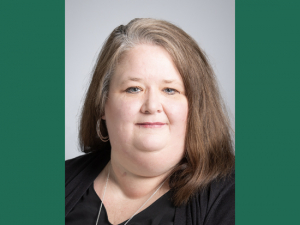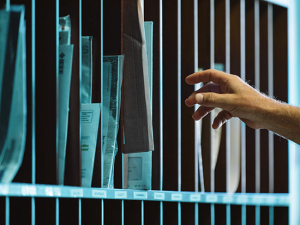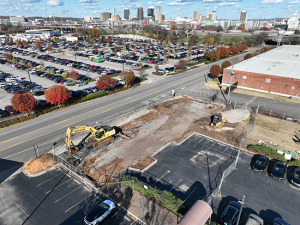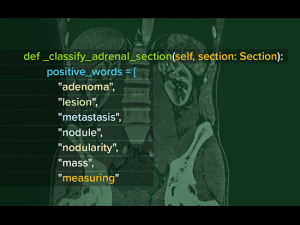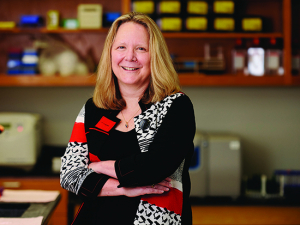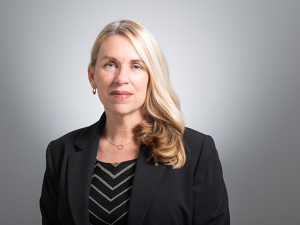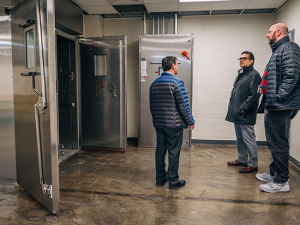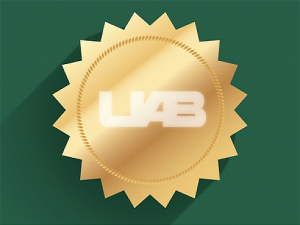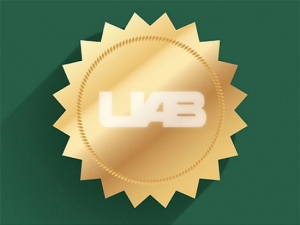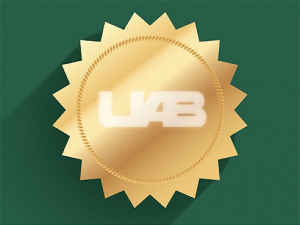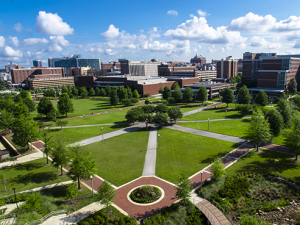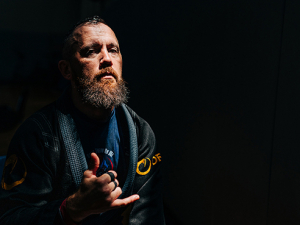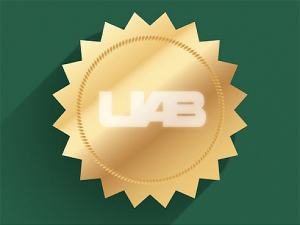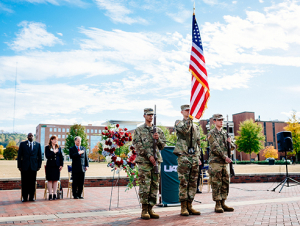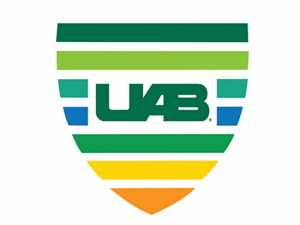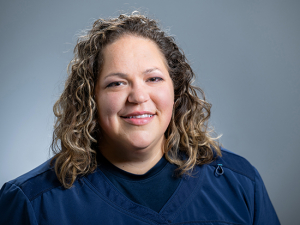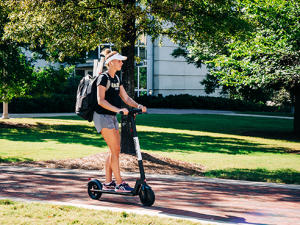-
Ford named first UAB SUCCESS ChampionThe UAB SUCCESS Initiative honors Eric Ford, Ph.D., professor in the School of Public Health and chair of the UAB Faculty Senate, for going above and beyond in shaping the student experience at UAB. Champions will be selected quarterly by the initiative’s executive steering committee.posted 3 days ago 367 viewsTown hall to highlight Research Strategic Initiative
Learn more about the initiative’s progress in this article and make plans to attend the town hall meeting at 10 a.m. March 19 for updates and questions with President Watts, Vice President Brown and working group leaders.
posted 5 days ago 501 viewsUAB-sponsored benefit options now include short-term disability insuranceStarting April 1, UAB will offer short-term disability insurance, which can help with financial obligations and expenses that health insurance won’t cover, such as food, childcare and mortgage or rent payments.posted 5 days ago 1223 viewsWhat a brain health expert wants you to know about the power of preventionRonald Lazar, Ph.D., director of UAB’s Evelyn F. McKnight Brain Institute, explains effective interventions, the importance of choice and why you should start where you are.posted 5 days ago 1091 viewsA message of gratitude on Employee Appreciation DayPresident Ray Watts and Chief Human Resources Officer Janet May applaud all UAB employees, today and every day, for their contributions to the workplace and to the overall mission of the institution.posted 9 days ago 1350 viewsHollis named chief financial officer at UABAlumnus Andy Hollis, who currently serves as interim chief financial officer and associate vice president for Financial Affairs, has been named CFO effective March 1.posted 16 days ago 1533 viewsSUCCESS town hall shares goals, metrics and next stepsRead an overview (or watch the full video) of Monday’s town hall meeting about the SUCCESS Initiative, which is building a road map to continue UAB’s past decade of enrollment growth and improve student success across the university.posted 16 days ago 654 viewsUpdates to My Health Rewards program draw more participants, more rewardsIn 2024, more than 6,400 employees activated their My Health Rewards account — 1,200 more activations than in 2023. Of those, 3,935 participants logged enough healthy behaviors last year to receive a payout of $50 or more. That trend has continued since the 2025 program launched earlier this year.posted 19 days ago 759 views3D-printed prostheses, orthoses will save time and money — and give patients a better fitA grant through UAB’s HSF-GEF program is funding the purchase of an advanced 3D printer for the Orthotics and Prosthetics Lab in the Department of Physical Medicine and Rehabilitation, which will make UAB’s Amputee Clinic the first in Alabama, and one of the few nationwide, to offer 3D-printed sockets for prosthetics.posted 24 days ago 1927 viewsWhat to do in a fender benderWhether you’re a new driver or one with decades of experience, a car accident can happen in the blink of an eye. Corporal Kimani George of UAB Police and Public Safety shares tips for dealing with a fender bender—plus how to avoid one.posted 26 days ago 1488 viewsUAB monitoring federal activityUAB leadership continues to work diligently with government relations professionals and meets regularly to monitor, assess and address rapidly evolving developments related to recent executive orders and guidance. Researchers with specific operational questions about their proposals, projects, or funding because of the executive orders or communications from federal agencies should reach out to the appropriate UAB officials listed in this story.posted 26 days ago 2113 views5 things you need to know about politics and institutional neutrality at UABThere are several important things to keep in mind about political speech and activity as a member of a community at a public university and academic medical center.
posted 26 days ago 2062 viewsFaculty share why they serve on Faculty SenateThe nomination period for this year’s Faculty Senate elections is open now and runs through March 6. Why do faculty choose to invest their time in taking part? Four current members explain the personal benefits of participation, including a deeper understanding of how UAB works, the opportunity to meet colleagues from very different areas of expertise and, perhaps most of all, the chance to accomplish meaningful change.posted 26 days ago 815 viewsShaping UAB’s future through the Campus Engagement SurveyPrevious survey responses led to enhancements in performance management across UAB.
posted a while back 703 views5 options for a fun night out on campusYou can always shake off a hectic day by scheduling fun times with others right here on campus. Here are five options to keep in mind for your next night out—no need to break the bank.posted a while back 1234 views8 views of January 2025 at UABSnow days, winter sun, blood drives — look back at some of last month's memorable campus images captured by UAB's official photographers.posted a while back 1282 viewsGrow into a greener office: 5 things a sustainability expert wants you to knowDo you want to conserve resources, reduce costs and create a healthier, more sustainable workplace? Consider these five opportunities for action from UAB Sustainability Officer Bambi Ingram.
posted a while back 781 viewsParsons believes in the power of recognitionNancy Parsons, administrative support specialist in the School of Dentistry, is the recipient of the 2024 President’s Award for Shared Values. In this story, Parsons shares why she is always ready to help new hires figure out UAB, and tips on getting the most out of working here.
posted a while back 999 views5 things a philosopher learned from diving deep into neuroscienceFree will still exists, and no brains are “typical”: Philosopher Josh May, Ph.D., shares some of the lessons he picked up by going back to school and joining a research lab to write “Neuroethics: Agency in the Age of Brain Science,” which was selected as one of the top academic titles of 2024.posted a while back 1436 views3 reasons you may be experiencing delays due to incorrect addressing of incoming mailIf you are experiencing delivery delays, be sure senders are using the correct address format, name and building abbreviations.posted a while back 1022 viewsDon’t miss these important surveysSurveys are an important tool to determine actions for improvement. This year, the UAB community will have several opportunities to provide feedback. Please complete all surveys that apply to your workgroup.posted a while back 978 views6 things to expect when UAB demolishes a buildingAs UAB inventories existing buildings, it often razes aging and energy-inefficient structures. Demolition of Denman Hall is going on now. Curious about the demolition process and what it might mean for you? Here’s what to expect.
posted a while back 9454 viewsLearn how UAB’s Shared Values: We CARE affect your work in this new seriesHow can you apply the new UAB Shared Values in your work? That is the subject of a new series from UAB Human Resources Learning & Development. Each virtual session will feature guest speakers from across campus. Provost Janet Woodruff-Borden, Ph.D., will lead the first session on collaboration at 11 a.m. Feb. 18.posted a while back 770 viewsAdvance your career with new Collat professional coursesCollat Professional Education offers live-online and self-paced courses in data visualization, AI for marketing, grant writing skills and more.posted a while back 5058 viewsJoin a working group for the SUCCESS InitiativeFollowing an analysis of results from a campuswide survey and stakeholder interviews, seven working groups have been created to address strategic priorities identified in the responses. Faculty and staff can apply to join a group. Learn more here. Also, RSVP for a town hall on the SUCCESS Initiative at 9 a.m. Feb. 24 at the Alumni House.posted a while back 1266 viewsShort survey — big impactsThe 2025 Campus Engagment Survey will be open from Feb. 3-17. Your investment of 20 minutes can lead to broad institutional changes to benefit your UAB experience and the experiences of others.posted a while back 1844 viewsLove match or dating disaster? Learn the signs of a healthy relationshipMica Harrell, M.A., director of Wellness Promotion in the division of Student Affairs, recommends that anyone who’s in the dating pool, whether student or employee, first familiarize themselves with what a healthy relationship looks like.
posted a while back 1998 viewsInside UAB’s AI-powered, human-centered adrenal clinicA study published in December 2024 demonstrates how natural language processing techniques, combined with dedicated human personnel, can flag unusual findings in radiology images and connect patients with follow-up care. The work, pioneered in nodules on the adrenal glands, has many applications, the researchers say.posted a while back 1125 viewsNIH implements stricter regulations on controlled-access dataSignificant updates to the Genomic Data Sharing Policy will take effect Jan. 25. The change affects new and renewed requests for data access from 20 NIH-supported data repositories. Learn more about how this affects UAB researchers in this article.posted a while back 1478 viewsLund is 2024–2025 Distinguished Faculty LecturerFran Lund, Ph.D., an internationally recognized scientist who has uncovered crucial additional roles for the immune system’s antibody-generating B cells, has been selected for the academic medical center’s highest faculty honor. Learn more about her career and current work in immune memory in this article.posted a while back 1942 viewsMy Health Rewards incentive program making updates in 2025My Health Rewards, the UAB Employee Wellness incentive program that rewards participants for healthy behaviors, launched this month with a new look, new platform and more point-earning opportunities.
posted a while back 2016 viewsSave the date: Mar. 19 town hall for Research Strategic Initiative: Growth with PurposeAttend a town hall at the Alumni House at 10 a.m. March 19, 2025, for an important update on UAB’s Research Strategic Initiative: Growth with Purpose.posted a while back 996 viewsLearn more about the new UAB Shared Values: We CAREDeveloped as part of UAB’s Forging Ahead strategic plan and informed by the Campus Engagement Survey, the values — Collaborate, Act with integrity, Respect all and Excel — should “influence the decisions we make, the way we work and how we treat others,” said President Ray Watts.posted a while back 1247 viewsDoes pregnancy protect a mom against Alzheimer’s? A new study sheds light on conflicting findings.Many studies have linked childbearing to a lower risk of being diagnosed with Alzheimer’s disease and dementia later in life. But in a new study, UAB sociologists found that early-life factors, including a woman’s socioeconomic status in adolescence, accounted for the apparent pregnancy-cognitive connection.posted a while back 1421 viewsAI-enhanced telesitter pilot program aims to improve care and safety of older adults in the EDA grant from UAB’s Health Services Foundation General Endowment Fund will support a project testing an AI tool trained to predict fall risk and identify signs of delirium in order to improve patient care and safety for older adults in UAB’s Geriatric Emergency Department at UAB Hospital-Highlands.
posted a while back 1803 viewsCenter for Teaching and Learning adds new offices of Learning Technologies and Continuing Education and Lifelong LearningAmy Chatham, Ph.D., has been named executive director of the expanded center. “These offices are here to help faculty and are laser-focused on providing the tools, training and service that enable UAB’s teachers to be the most effective,” said Scott Phillips, Ph.D., vice provost for Innovative Teaching and Academic Engagement.posted a while back 1565 viewsBarnes named senior vice provost for enrollment management & student successBradley Barnes, Ph.D., joined UAB in 2017 as vice provost for enrollment management. His new role will focus on integrating and improving student experience.posted a while back 1699 viewsUAB upgrades research infrastructure with new additionThe $1 million project to install the university’s first bulk dry heat sterilizer was made possible through a grant from the NIH and internal investments as part of the Research Strategic Initiative: Growth with Purpose. Dry heat sterilization is more efficient and saves power and water.posted a while back 1499 viewsUAB names Kimberlin new Clinical Trials VPAfter an extensive national search, UAB has appointed David Kimberlin, M.D., as associate vice president for Clinical Trial Operations, effective Jan. 1, 2025.
posted a while back 4499 viewsOur favorite photos of 2024Each year, UAB’s official photographers capture tens of thousands of images as they document the incredible variety of events and personalities that make up our community. Here are some of our favorite photos from the past 12 months.posted a while back 2991 views-
Shaping UAB’s future through the Campus Engagement Survey
Previous survey responses led to enhancements in performance management across UAB.
posted a while back 703 viewsLearn how UAB’s Shared Values: We CARE affect your work in this new seriesHow can you apply the new UAB Shared Values in your work? That is the subject of a new series from UAB Human Resources Learning & Development. Each virtual session will feature guest speakers from across campus. Provost Janet Woodruff-Borden, Ph.D., will lead the first session on collaboration at 11 a.m. Feb. 18.posted a while back 770 viewsJoin a working group for the SUCCESS InitiativeFollowing an analysis of results from a campuswide survey and stakeholder interviews, seven working groups have been created to address strategic priorities identified in the responses. Faculty and staff can apply to join a group. Learn more here. Also, RSVP for a town hall on the SUCCESS Initiative at 9 a.m. Feb. 24 at the Alumni House.posted a while back 1266 viewsUpdated training on fiscal responsibility to be required“Understanding Your UAB Fiscal Responsibility,” which is focused on the role employees play in managing UAB’s financial resources, will be assigned to certain employees based on job function through the UAB Learning System beginning July 1, 2024.posted a while back 2274 views12 honored for excellence in teachingTwelve faculty have been selected to receive the President’s Award for Excellence in Teaching, which honors those who have demonstrated exceptional accomplishments in teaching. The 2023 honorees represent each school, the College of Arts and Sciences, the Honors College, and the Graduate School.
posted a while back 6781 views9 faculty elevated to Distinguished, University professorshipsThe UA System Board of Trustees awarded the rank of Distinguished Professor to Ravi Bhatia, Heith Copes, Craig Elmets, Denise A. Gainey, Jeffrey D. Kerby, Farah D. Lubin, Jean-François Pittet and Martin E. Young and the rank of University Professor to Peter S. Hendricks during its meetings in April and June 2023.posted a while back 7802 views3 chosen as UAB VIPs for second-quarter 2023Kayla Evans, Damian Schwartz and Brigitte Vola are the second-quarter 2023 honorees of the UAB Shared Values in Action Program, which honors those whose work exemplifies and embodies Forging the Future’s shared values. Nominations for third-quarter 2023 honorees are open through Aug. 23.posted a while back 4995 views4 honored with Provost's Awards for Faculty ExcellenceJie Gao, Camerron Crowder, Ken Marion and James B. McClintock demonstrated extraordinary commitment to engaging undergraduate students in service learning, undergraduate research and education-abroad experiences.
posted a while back 4865 views9 years running: UAB again honored as Tree Campus USAFor the eighth year, UAB is recognized by the National Arbor Day Foundation for its work to nurture more than 4,400 healthy trees and engage students and employees in conservation. UAB also was honored for the fourth time with a Tree Campus Healthcare designation, which recognizes health institutions that make a mission-aligned impact on community wellness through tree education, investment and community engagement.
posted a while back 5862 views3 chosen as UAB VIPs for first-quarter 2023Toby W. Tripp, Andrew B. Crouse and Carin Mayo are the first-quarter 2023 honorees of the UAB Shared Values in Action Program, which honors those whose work exemplifies and embodies Forging the Future’s shared values. Nominations for second-quarter 2023 honorees are open through May 24.
posted a while back 4532 viewsUAB authors can publish open access in Wiley, Cambridge journals at no costTwo agreements between UAB Libraries and Wiley and Cambridge University Press will enable university-affiliated authors to publish open access at no cost in more than 2,000 journals.
posted a while back 5590 viewsUAB recognizes 2023 diversity championsFive individuals and one student organization were honored with the 2022 President’s Diversity Champion Award during a ceremony at the Alumni House March 2.
posted a while back 6125 views3 chosen as UAB VIPs for fourth-quarter 2022Tatyana Gavrikova, Sherry Polhill and Aparna Tamhane are the fourth-quarter 2022 honorees of the UAB Shared Values in Action Program, which honors those whose work exemplifies and embodies Forging the Future's shared values. Nominations for first-quarter 2023 honorees are open through Feb. 28.
posted a while back 5116 views15-minute online training shares tips on how to best support students with disabilitiesEmployees can learn about compliance with the Americans with Disabilities and Rehabilitation acts, explore best practices for engaging with students with disabilities, and access key resources during a new online training from UAB Disability Support Services.
posted a while back 4369 views2022 in review: A banner Blazer yearPrograms across the university, from athletics to academics to patient care and more, were recognized on the national and international level in 2022, highlighting UAB’s continued commitment to excellence and achievement as outlined in Forging the Future, UAB’s strategic plan.
posted a while back 7276 views2022 in review: UAB’s gold-medal performanceDay after day during the World Games, contributions from Blazers made it possible to make athletes’ dreams come true and entertain fans while giving them a peek at the wealth of talent and creativity nurtured on UAB’s campus.
posted a while back 4960 views4 honored with Provost’s Awards for Faculty ExcellenceAna Oliveira, Sami Raut, Lisa McCormick and Meena Nabavi demonstrated extraordinary commitment to engaging undergraduate students in service learning, undergraduate research and education-abroad experiences.
posted a while back 4751 viewsWhat you need to know about the new NIH data management and sharing policyBeginning Jan. 25, 2023, the National Institutes of Health will implement a new data management and sharing policy, which will increase the rigor, reproducibility and transparency of research and create open access to data.
posted a while back 5474 views12 honored for excellence in teachingTwelve faculty have been selected to receive the President’s Award for Excellence in Teaching, which honors those who have demonstrated exceptional accomplishments in teaching. The 2022 honorees represent each school, the College of Arts and Sciences, the Honors College and the Graduate School.
posted a while back 9499 views4 ways to honor service members this Veterans DayAttend the annual wreath-laying, donate to a blanket and clothing drive, read stories from UAB veterans and leave a message of thanks.
posted a while back 4386 views-
Parsons believes in the power of recognitionNancy Parsons, administrative support specialist in the School of Dentistry, is the recipient of the 2024 President’s Award for Shared Values. In this story, Parsons shares why she is always ready to help new hires figure out UAB, and tips on getting the most out of working here.
posted a while back 999 views6 things to expect when UAB demolishes a buildingAs UAB inventories existing buildings, it often razes aging and energy-inefficient structures. Demolition of Denman Hall is going on now. Curious about the demolition process and what it might mean for you? Here’s what to expect.
posted a while back 9454 viewsLearn how UAB’s Shared Values: We CARE affect your work in this new seriesHow can you apply the new UAB Shared Values in your work? That is the subject of a new series from UAB Human Resources Learning & Development. Each virtual session will feature guest speakers from across campus. Provost Janet Woodruff-Borden, Ph.D., will lead the first session on collaboration at 11 a.m. Feb. 18.posted a while back 770 viewsLearn more about the new UAB Shared Values: We CAREDeveloped as part of UAB’s Forging Ahead strategic plan and informed by the Campus Engagement Survey, the values — Collaborate, Act with integrity, Respect all and Excel — should “influence the decisions we make, the way we work and how we treat others,” said President Ray Watts.posted a while back 1247 views3 chosen as UAB VIPs for second-quarter 2024John Huffstutler, Nancy Parsons and Angel Simmons are the second-quarter 2024 honorees of the UAB Values in Action Program. Nominations for third-quarter 2024 honorees are open through July 11.
posted a while back 3124 viewsUpdated training on fiscal responsibility to be required“Understanding Your UAB Fiscal Responsibility,” which is focused on the role employees play in managing UAB’s financial resources, will be assigned to certain employees based on job function through the UAB Learning System beginning July 1, 2024.posted a while back 2274 views“Find the passion and it is easy to do the rest”: What makes Brigitte Vola go above and beyond.Brigitte Vola, wound, ostomy and continence nurse in Trauma Services, is the 2023 winner of the President’s Award for Excellence in Shared Values.posted a while back 3094 views12 honored for excellence in teachingTwelve faculty have been selected to receive the President’s Award for Excellence in Teaching, which honors those who have demonstrated exceptional accomplishments in teaching. The 2023 honorees represent each school, the College of Arts and Sciences, the Honors College, and the Graduate School.
posted a while back 6781 viewsDid you know? Improperly parking scooters can make campus inaccessible for some BlazersMicromobility vehicles like rentable electric scooters and bikes make getting across campus quickly a breeze. But parking them improperly can prevent Blazers from accessing sidewalks, ramps, accessible doorways and more, according to Disability Support Services.
posted a while back 5047 views5 things to know before you order UAB swag for fallIf your school or unit wants new branded promotional items and apparel for fall semester, these guidelines can help you avoid delays.
posted a while back 11087 views9 faculty elevated to Distinguished, University professorshipsThe UA System Board of Trustees awarded the rank of Distinguished Professor to Ravi Bhatia, Heith Copes, Craig Elmets, Denise A. Gainey, Jeffrey D. Kerby, Farah D. Lubin, Jean-François Pittet and Martin E. Young and the rank of University Professor to Peter S. Hendricks during its meetings in April and June 2023.posted a while back 7802 views3 chosen as UAB VIPs for second-quarter 2023Kayla Evans, Damian Schwartz and Brigitte Vola are the second-quarter 2023 honorees of the UAB Shared Values in Action Program, which honors those whose work exemplifies and embodies Forging the Future’s shared values. Nominations for third-quarter 2023 honorees are open through Aug. 23.posted a while back 4995 viewsAnnual performance evaluation cycle open now: Here’s what you need to knowEligible employees in workgroup A will complete self-evaluations in the Performance App. Managers must have conversations with employees and complete evaluations by Sept. 30. Check your workgroup here and visit the Performance Management site for tools, FAQs and training.
posted a while back 6139 views4 honored with Provost's Awards for Faculty ExcellenceJie Gao, Camerron Crowder, Ken Marion and James B. McClintock demonstrated extraordinary commitment to engaging undergraduate students in service learning, undergraduate research and education-abroad experiences.
posted a while back 4865 views9 years running: UAB again honored as Tree Campus USAFor the eighth year, UAB is recognized by the National Arbor Day Foundation for its work to nurture more than 4,400 healthy trees and engage students and employees in conservation. UAB also was honored for the fourth time with a Tree Campus Healthcare designation, which recognizes health institutions that make a mission-aligned impact on community wellness through tree education, investment and community engagement.
posted a while back 5862 views3 chosen as UAB VIPs for first-quarter 2023Toby W. Tripp, Andrew B. Crouse and Carin Mayo are the first-quarter 2023 honorees of the UAB Shared Values in Action Program, which honors those whose work exemplifies and embodies Forging the Future’s shared values. Nominations for second-quarter 2023 honorees are open through May 24.
posted a while back 4532 viewsUAB recognizes 2023 diversity championsFive individuals and one student organization were honored with the 2022 President’s Diversity Champion Award during a ceremony at the Alumni House March 2.
posted a while back 6125 views3 chosen as UAB VIPs for fourth-quarter 2022Tatyana Gavrikova, Sherry Polhill and Aparna Tamhane are the fourth-quarter 2022 honorees of the UAB Shared Values in Action Program, which honors those whose work exemplifies and embodies Forging the Future's shared values. Nominations for first-quarter 2023 honorees are open through Feb. 28.
posted a while back 5116 views15-minute online training shares tips on how to best support students with disabilitiesEmployees can learn about compliance with the Americans with Disabilities and Rehabilitation acts, explore best practices for engaging with students with disabilities, and access key resources during a new online training from UAB Disability Support Services.
posted a while back 4369 views2022 in review: A banner Blazer yearPrograms across the university, from athletics to academics to patient care and more, were recognized on the national and international level in 2022, highlighting UAB’s continued commitment to excellence and achievement as outlined in Forging the Future, UAB’s strategic plan.
posted a while back 7276 views
